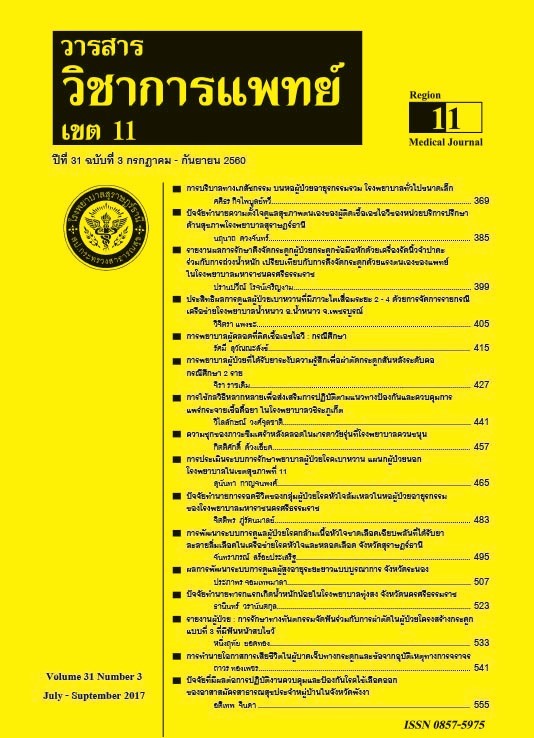Pharmaceutical care in general medical ward at middle-level Hospital
Keywords:
pharmaceutical care, drug related problems, hospital pharmacyAbstract
Objective : Of this study was to identify types and frequencies of drug-related problems (DRPs) found during hospitalization in general medical ward, Sichon hospital, during April 1, 2015 – March 31, 2016. It was a prospective descriptive study. The ward pharmacist reviewed the medical chart by focusing
on patients’ data, drug used and administration and potential adverse drug reaction; medication reconciliation, interview and counseling patients and/or caregiver. If any DRPs were detected, ward pharmacist would coordinated with health care team, patient and/or caregiver for preventing, solving or monitoring. All of DRPs were classified and scored for their potential clinical impact by ward pharmacist. Results : Showed that ward pharmacist had observed 440 DRPs in 345 patients (15.5% of 2,225 patients). The most frequent DRPs was untreated indications (33.2%), followed by improper drug selection (21.8%) and drug use without indication (10.9%), 92.3% of DRPs could be prevent or solve by ward pharmacist. The majority of potential clinical impact score of pharmacist intervention was significance (38.4%). Pharmacists’ recommendations were received with high acceptance (93.2%) The results of this study was an opportunity for improve the medication management system for efficacy and quality care and treatment outcome though the medication safety in hospital
References
2. Prince BS, Goetz CM, Rihn TL, Olsky M. Drug-related emergency department visits and hospital admission. Am J Pharm 1992;49:1696-700.
3. Ives TJ, Bentz EJ, Gwyter RrE. Drug-related admission to a family medicine inpatient service. Arch Intern Med 1987;147:1117-20.
4. Johnson JA, Bootman JL. Drug-related morbidity and mortality. Arch Intern Med 1995;155:1949-56.
5. Chisholm MA, Pittman DG, Longley JM, Mullis SR. Implementation of pharmaceutical care in acute medical cardiovascular patients. Hosp Pharm 1995;30:572-4.
6. Donald YK, Joan VH, Bo T, Freeman CH. Involvement of HMO-based pharmacists in clinical rounds at contract hospitals. Am J Health-Syst Pharm 1997;54:670-3.
7. Smythe MA, Shah PP, Spiteri TL, Lucarotti RL, Begle RL. Pharmaceutical care in medical progressive care patients. Ann Pharmacother 1998;32:294-9.
8. Luciun LL, David CJ, Margaret CD, Elisabeth B, Harold DJ, Jeanette EI, et al. Pharmacist participation on physician rounds and adverse drug events in the intensive care unit. JAMA 1999;282:267-70.
9. กมล คุณาประเสริฐ. การจัดการความคลาดเคลื่อนทางยาโดยเภสัชกรประจำหอผู้ป่วย. วารสารเภสัชกรรมโรงพยาบาล 2547;14:9-16.
10. สถาบันรับรองคุณภาพสถานพยาบาล (องค์การมหาชน). มาตรฐานโรงพยาบาลและบริการสุขภาพ ฉบับเฉลิมพระเกียรติฉลองสิริราชสมบัติครบ 60 ปี (ภาษาไทย). นนทบุรี: สถาบัน; 2558.
11. Bernt P, Egberts L, Berg L, Brouwers J. Drug-related problems in hospitalized patient. Drug Safety 2000;22:321-33.
12. Bednall R. Drug-related problems may bring thousands to A&E departments. The Pharmaceutical Journal 2003;45:270-359.
13. เยาวลักษณ์ สิทธิเดช. การจัดการปัญหาเกี่ยวกับยาที่พบในหออายุรกรรมชาย โดยเภสัชกรประจำหอผู้ป่วย. วารสารเภสัชกรรมโรงพยาบาล 2007;17:109-19.
14. เพียงเพ็ญ ชนาเทพาพร. การประเมินการบริบาลทางเภสัชกรรมบนหอผู้ป่วยอายุรกรรมหญิงในโรงพยาบาลมหาวิทยาลัย. ศรีนครินทร์เวชสาร 2549;21:282-8.
15. เฉลิมศรี ภุมมางกูร. ปรัชญาของการบริบาลทางเภสัชกรรมปฏิบัติ. ใน: เฉลิมศรี ภุมมางกูร, กฤตติกา ตัญญะแสนสุข, บรรณาธิการ. โอสถกรรมศาสตร์. กรุงเทพฯ: นิวไทยมิตรการพิมพ์ 1996 จำกัด; 2543. หน้า 1-19.
16. รัชฎาพร วิสัย, อุษา ศรีปัญญาวิชญ์, ปรีชา อารีมิตร, เชิดชัย สุนทรภาส, นฤมล วีระยิ่งยง. ประสิทธิผลการบริบาลทางเภสัชกรรมบนหอผู้ป่วยอายุรกรรม. วารสารเภสัชกรรมโรงพยาบาล 2543;10:126-32.
17. Strand LM, Morley PC, Cipolle RJ, Ramsey R, Lamsam G. Drug related problem: their structure and function. DICP Pharmacother 1990;24:1093-7.
18. Pharmaceutical Care Network EuropeFoundation. PCNE classification for drug-related problems V5.01 [internet]. 2006 [cited 2012 July 15]. Available from: http://www.pcne. org/upload/files/16 PCNE_classification_V5.01.pdf
19. van Mil JW, Westerlund LO, Hersberger KE, Schaefer MA. Drug–related problem classification systems. Ann Pharmacother 2004;38:859-67.
20. World Health Organization. Safety of Medicines. A guide to detecting and reporting adverse drug reaction [internet]. 2002. [cited 2005 Dec 26]. Available from: http://apps.who.int/iris/bitstream/ 10665/67378/1/WHO_EDM_QSM_2002.2.pdf
21. Hatoum HT, Hutchinson RA, Witte KW, Newby GP. Evaluation of the contribution of clinical pharmacist: inpatient care and reduction. DICP Ann Pharmacother 1988;22:252-9.
22. วงศ์นี กุลพรม. การบริบาลทางเภสัชกรรมผู้ป่วยในที่โรงพยาบาลจัตุรัส [วิทยานิพนธ์ปริญญาเภสัชศาสตร์มหาบัณฑิต]. กรุงเทพฯ: จุฬาลงกรณ์มหาวิทยาลัย; 2542.
23. วงศ์นี กุลพรม. การบริบาลทางเภสัชกรรมบนหอผู้ป่วยอายุรกรรมชาย. วารสารเภสัชกรรมโรงพยาบาล2546;13:22-8.
24. วรวรรณ บุญประเทือง. การพัฒนารูปแบบการบริบาลทางเภสัชกรรมบนหอผู้ป่วยอายุรกรรม โรงพยาบาลจุฬาลงกรณ์ [วิทยานิพนธ์ปริญญาเภสัชศาสตร์มหาบัณฑิต]. กรุงเทพฯ: จุฬาลงกรณ์มหาวิทยาลัย; 2544.






